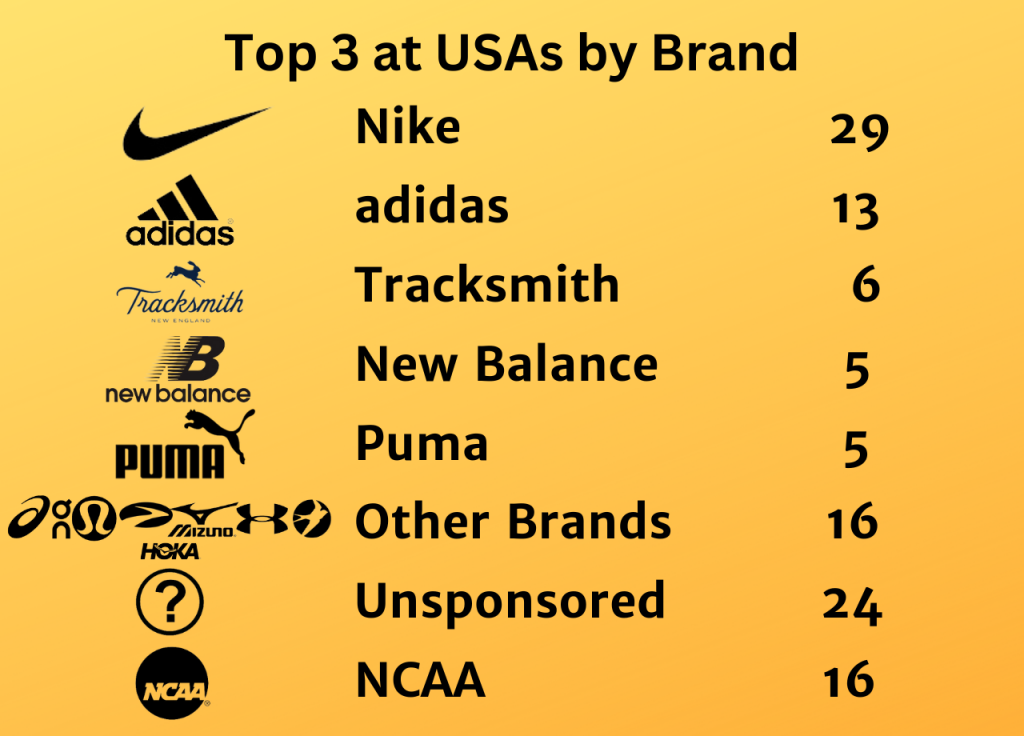How Tracksmith Conquered the 100m at USAs: The Amateur Support Program
By Alex GeulaThis year at USATF Outdoor Championships, there were many different kits worn by a plethora of different athletes. The irony of the sponsorship game is that everyone is competing for a shot to not wear the kit that they wore to USAs, but rather the Team USA kit provided by Nike for Budapest.
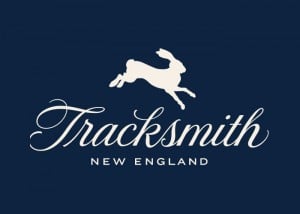 Many of the brands involved are household names like Nike or adidas. Other brands are smaller and more niche to the running world such as Brooks or HOKA. Then there’s Tracksmith, whose apparel has traditionally been specific to distance runners and a brand that only recently came out with its first shoe. But it was a Tracksmith sponsored athlete Cravont Charleston who won the premier event in the sport at USAs, the men’s 100m.
Many of the brands involved are household names like Nike or adidas. Other brands are smaller and more niche to the running world such as Brooks or HOKA. Then there’s Tracksmith, whose apparel has traditionally been specific to distance runners and a brand that only recently came out with its first shoe. But it was a Tracksmith sponsored athlete Cravont Charleston who won the premier event in the sport at USAs, the men’s 100m.
Larger brands have more money and resources, which traditionally has allowed them to sponsor not just a greater quantity of athletes but a higher quality of athlete (in terms of high school/collegiate pedigree). Despite this fact, Tracksmith is sending six Americans to the World Championships in Budapest next month. That’s the 3rd-most of any brand, behind only Nike and adidas and ahead of the likes of New Balance, Puma, Lululemon, Brooks, Under Armour, and ASICS.
How did Tracksmith pull off this feat? Through their Amateur Support Program (ASP). Given Tracksmith’s success at USAs, a deeper dive was required to find out more about how the company started, and what led to the creation of the ASP.
Origins of Tracksmith and the ASP
The CEO of Tracksmith, Matt Taylor, started the brand in 2013 after working in track & field marketing for many years. He was the head of marketing for Puma in their running, training, and fitness department for a few years, often working with Usain Bolt. Before that, he put together a series of documentaries following the journeys of different runners to success on the national and global level. Matt has also been tied to LetsRun since the beginning, as he was college teammates with co-founder Weldon Johnson and hosted a party for Weldon on the eve of the 2000 US Olympic Marathon Trails in Matt’s native Pittsburgh. Matt even served as a consultant to LetsRun.com at one point.
(Editor’s note: Author Alex Geula, LetsRun.com’s summer intern, didn’t know of all of these connections between Matt and LetsRun and unprompted after USAs this year said he’d like to write an article on Tracksmith’s Athlete Support Program. We said go for it)
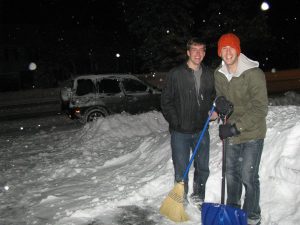 Wejo and Matt Taylor
Wejo and Matt Taylor
Matt walked me through the origins of the ASP from 2019. In the beginning, the program was called the OTQ program, giving gear to runners who hit the Olympic Trials qualifying (OTQ) standard in the marathon. At first, many of the runners in the OTQ program were “employees of the company and friends of the brand.” The program started off very small, providing those in the program with a gear stipend and the occasional nutritional supplement or coffee.
However, the program grew and grew as more and more people heard about the OTQ program and were hitting the qualifying marks. At the 2020 Olympic Trials Marathon in Atlanta, roughly one in five runners on the starting line were wearing a Tracksmith singlet, which summed to approximately 140 runners.
Nick Willis Leads the ASP
After realizing such great success with the 2020 US Olympic Marathon Trials, when the pandemic pushed the 2020 Olympic track and field trials to 2021, Matt thought it would be a good idea to try and replicate the program on the track. Well before starting Tracksmith, Matt’s wife gifted Nick Willis‘ miler training program to him for his birthday, and Matt got to know the two-time Olympic medalist from New Zealand. Wanting to continue his involvement in the sport past retirement, Nick showed heavy interest in Tracksmith after meeting Matt and eventually took Matt’s deal to work for the brand even with another offer on the table from adidas to continue his running career. Willis took the lead on the ASP for the 2021 Trials.
The ASP had a gradual onboarding process for the 2021 Olympic Trials. The program is application-based, and applications did not open until October 2020 for the athletes interested in garnering Tracksmith’s support for the 2021 Trials. At first, Matt thought interest would be limited to distance runners. Instead, athletes from across the track & field event spectrum applied. Five Tracksmith athletes made the Olympics in 2021, including two in the steeplechase, and one in the discus, hammer throw, and javelin.
Now the ASP is an every-year thing, mainly focused on two events, the USATF Outdoor Championships and the U.S. Olympic Marathon Trials. In years without an Olympic Marathon Trials, Tracksmith will pick a major marathon in the U.S. (NYC, Chicago, Boston) and use one of those as a substitute. At these events, Tracksmith covers travel and lodging for all ASP athletes. If the athlete prefers to make other housing arrangements, they are given $500 towards their expenses.
At the city in which the event is held, Tracksmith will also have a “track house” where all Tracksmith athletes are welcome. The track house will have food, drink, a place to hang out, as well as physiotherapists, massage therapists, Normatec boots, ice and hot baths, and other recovery tools to make sure the athletes are well prepared for their events. Outside of the major events, every athlete is given a gear stipend where they can purchase whatever gear that suits them on Tracksmith’s website. Additionally, outside of the gear stipend, Tracksmith provides them a race kit and warmup kit. In return, Tracksmith wants them to only wear Tracksmith gear on race day.
Currently, there are 175 athletes in the program. 155 based in the U.S. and 20 in the U.K. The athletes receive approximately $1500-2000 in product, and all USATF outdoor championships athletes receive the free lodging or $500 toward their travel expenses according to Willis. Other support is on a case-by-case basis.
A main sentiment that both Nick and Matt expressed was that the ASP was a program and not a sponsorship. The program is application-based and a meritocracy where all applicants are viewed equally and the benefits that the athletes have in the program are all equal. Many of the athletes in the program are coming from a collegiate team and environment where all of the logistics of a track & field season are taken care of. The schedule, transportation, fees, etc are all planned out by a coaching staff. Entering into the professional scene without a sponsor or a team can be intimidating, comparable to the “Wild West,” said Willis. Willis created a calendar of events for the athletes in the ASP to access, and reached out to meet directors on behalf of athletes in his program to help them get into meets across the U.S. and sometimes around the world. Freddie Crittenden, the third placer at USAs in the 110 hurdles this year, said that “it’s nice to be able to see other people out there repping the same kit as you.”
This same feeling was echoed by a lot of the other athletes in the program. While finances are a concern for many unsponsored athletes at USAs, the community and camaraderie of the ASP was another factor driving these athletes to apply for the ASP. Curtis Thompson, three-time US javelin champion, said he loves the “support and being part of a community.” The ASP acts as a team and fosters a community for the athletes. The non-financial support is crucial for the athletes, and the feeling of a team is one that cannot be faked.
Athletes who have really taken off under Tracksmith’s support, such as Rudy Winkler and Cravont Charleston, may also receive international travel funding if they apply for it. After winning the 100m title in Eugene a few weeks ago, Charleston praised Tracksmith for all they have done.
“I thank God for them everyday, because without them it would be much harder,” Charleston said. “They take a lot of stress off of me with gear and financially.”
In addition, if it is an Olympic year and someone is close to the Olympic standard, Tracksmith might pay for the athlete’s travel expense to chase the standard somewhere in the U.S. It varies on a case-by-case basis, with the brand helping out as much as they possibly can.
Nick makes the selections for who is admitted and denied entry into the ASP. The selection process for the ASP is not very complicated, with only a few rules. First, if someone has achieved the qualifying standard for the US Championships, they are automatically granted entry into the program no matter the event. A goal of the ASP is to have an even distribution of athletes across all events, but that is very hard to do as nobody can control who applies and which event they do. Second, there is a cap to some events, such as the steeplechase (which features a number of ASP athletes) in order to preserve a balance. Finally, there is an even split between the amount of marathoners and the amount of track & field athletes. As of now, there are around 150 total athletes in the program.
The simple goal of the program is to “help people achieve their goals,” says Willis. Success for the program is “graduating onto a professional contract and to use Tracksmith as a stepping-stone to do so.”
Graduates of the Program
There are many athletes who have completed what Matt and Nick detail as “success” under the ASP program. These athletes have transitioned to a professional contract from another brand where they receive a base salary and bonus incentives for records, making teams, running certain times, etc. A few of them include former U.S. marathon record holder and current U.S. half marathon record holder Keira D’Amato, 2021 steeplechase Olympians Mason Ferlic and Valerie Constein, and U.S. half marathon champion Jacob Thomson.
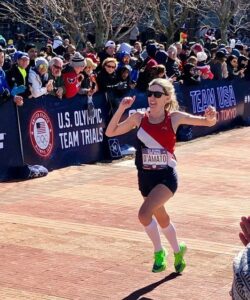 Keira D’Amato finishing the 2020 USA Olympic Team Trials Marathon in Atlanta on February 29 (photo courtesy of the Credit Union Cherry Blossom 10-Miler)
Keira D’Amato finishing the 2020 USA Olympic Team Trials Marathon in Atlanta on February 29 (photo courtesy of the Credit Union Cherry Blossom 10-Miler)
Both Ferlic and Thomson had professional contracts before their time with Tracksmith. Ferlic was a Nike athlete from 2016 to 2019 and Thomson was an athlete competing for the BAA and Adidas from 2017 to 2020. Nike chose not to extend Ferlic’s contract after 2019. Thomson did receive an extension offer but chose to move to Flagstaff instead to continue pursuing his running dream.
Ferlic was dejected after not receiving a contract extension from Nike in 2020 and did not bother to look for a new contract or team. He knew about Tracksmith as he was training partners with Willis, a fellow Michigan alum, as part of the Very Nice Track Club in Ann Arbor. Ferlic, who is currently pursuing a PhD in statistics at Michigan, laid out a proposal to Tracksmith: he would work for them as a data scientist and help out with consulting, marketing, and business intelligence as a full-time employee while also pursuing his dream of becoming an Olympian in the steeplechase with their ASP. This aligned with Tracksmith’s vision of not replacing the traditional sponsorship, and thus Ferlic was a part of the team, more so than probably any other Tracksmith athlete.
After his success with Tracksmith and becoming an Olympian in 2021, Ferlic was able to sign a professional contract with adidas. He expressed incredible gratitude and love towards Tracksmith for their time and effort in supporting him as an athlete. However, in comparing the two deals, Ferlic, like Taylor and Willis, would not really call the ASP a traditional “contract.” Rather, it is “a way to feel supported at USAs, where you can leave anytime if something else pops up.”
Thomson was introduced to Tracksmith through the brand’s Director of Community, Louis Serafini. Thomson runs his own online coaching platform, and was able to support himself during his year of transition between professional contracts. However, Tracksmith was able to add some support. In the beginning stages of the ASP, Tracksmith did not have as many athletes as today, and was able to send Thomson to three different meets across the U.S. to chase the Olympic standard in the 10,000m. Thomson represented Tracksmith in the 2021 Olympic Trials, but finished 17th and did not make the team.
Thomson then embodied the Tracksmith spirit of distance running and took a shot at the marathon, debuting in Chicago in the fall of 2021, placing 12th overall in a time of 2:15:49. In training for his first marathon, Thomson is forever grateful to Geoff Burns, currently a physiologist for Team USA, who previously worked with Tracksmith and gave Thomson unique insight into the fueling and science behind the marathon. Thomson trained for the marathon in Flagstaff, working with Stephen Haas from time to time and a lot of the Under Armour-sponsored athletes. This relationship, accompanied with his performance in Chicago, opened the door for him to earn a contract offer by Under Armour.
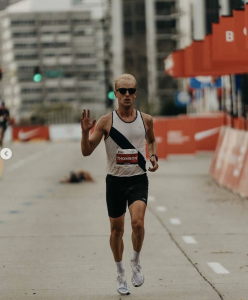 Jacob Thomson finishing 2021 Chicago Marathon (Courtesy of Thomson’s Instagram)
Jacob Thomson finishing 2021 Chicago Marathon (Courtesy of Thomson’s Instagram)
While Tracksmith does not directly offer services to help with the professional transition, they do in an indirect way — all other companies know that athletes part of the ASP are willing and able to accept a contract offer.
Moving Forward
Tracksmith will be sending six athletes to Worlds next month: Charleston (100), Winkler (hammer), Crittenden (110 hurdles), Thompson (javelin), Stephanie Casey (20k race walk), and Brian Williams (discus). Charleston and Winkler are both capable of making a lot of noise at Worlds, with both men in the medal conversation in their respective events. Winkler told me he has “struggled to find support” even though he’s the American record holder and a four-time national champion. Trips to Europe are mostly paid for by USATF international stipends coupled with the meets helping out with travel costs and lodging, along with the occasional international help from Tracksmith. Now ranked #2 in the world in the hammer, Winkler is looking to come home with a medal.
Fall marathon season is also quickly approaching, and once that is done, everyone’s focus will shift to the U.S. Olympic Marathon Trials on February 3 in Orlando. Top Tracksmith marathoner Turner Wiley (2:11:59 pb), hopes for the ASP to “have as many people on the line in Orlando as possible.” Wiley said he could not be more appreciative of “the amazing community” Tracksmith has built and for “bridging the gap between professionals and amateurs.” Wiley is contesting a fall marathon this year (yet to be announced), and will be shooting for a time of 2:11:30 to be eligible to make the Paris 2024 Olympic team.
The Olympic Marathon Trials starting line is likely to be adorned with athletes in Tracksmith gear, as the company has proven that they are very efficient at what they do, supporting athletes who fall through the cracks. This is closely associated with their “amateur ethos”. In today’s era, athletes ultimately want to get paid and beyond their Tracksmith support. That day will come soon for Cravont Charleston. Tracksmith will know it played a unique role in making it happen.
| Company | # of Athletes in Top 3 at USAs |
| Nike | 29 |
| Unsponsored | 24 |
| NCAA | 16 |
| adidas | 13 |
| Tracksmith | 6 |
| New Balance | 5 |
| Puma | 5 |
| ON Running | 4 |
| ASICS | 3 |
| lululemon | 2 |
| Brooks | 2 |
| Mizuno | 1 |
| Under Armour | 1 |
| HOKA | 1 |
| Oiselle | 1 |
| Kiprun | 1 |
